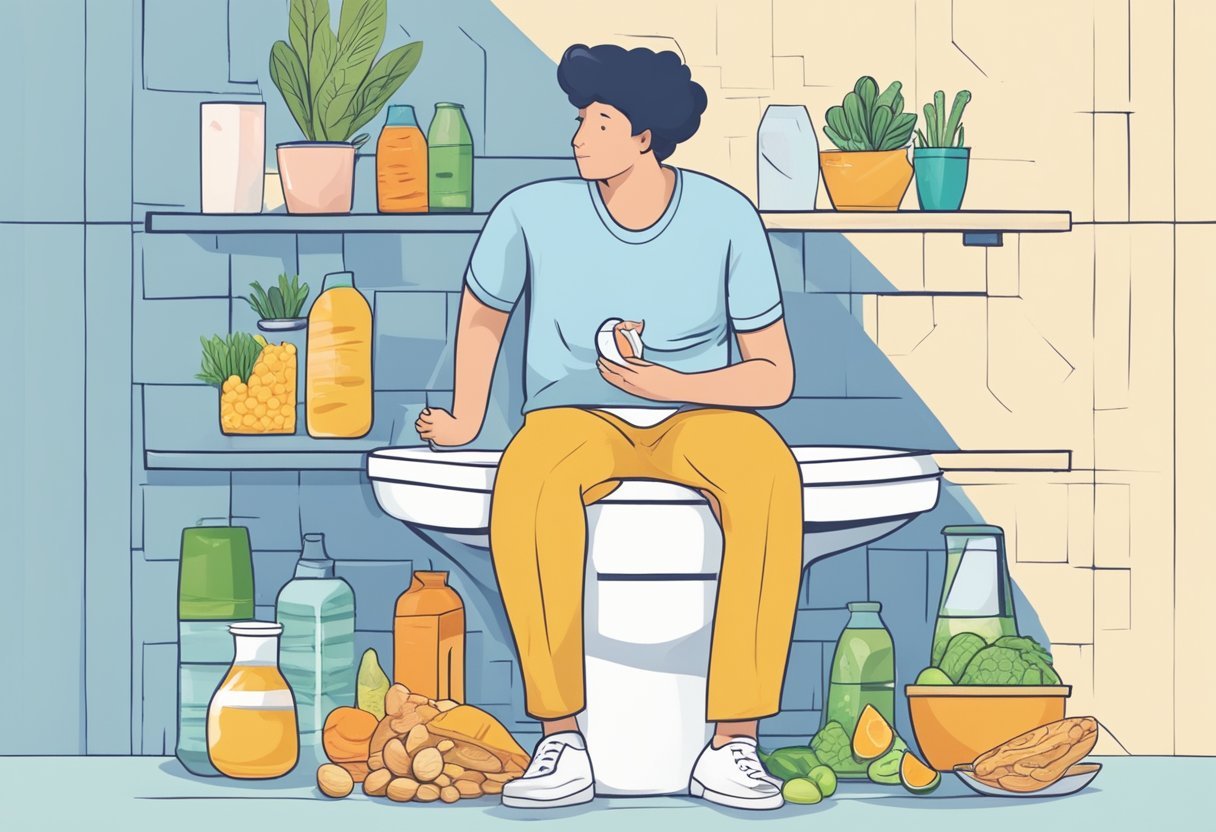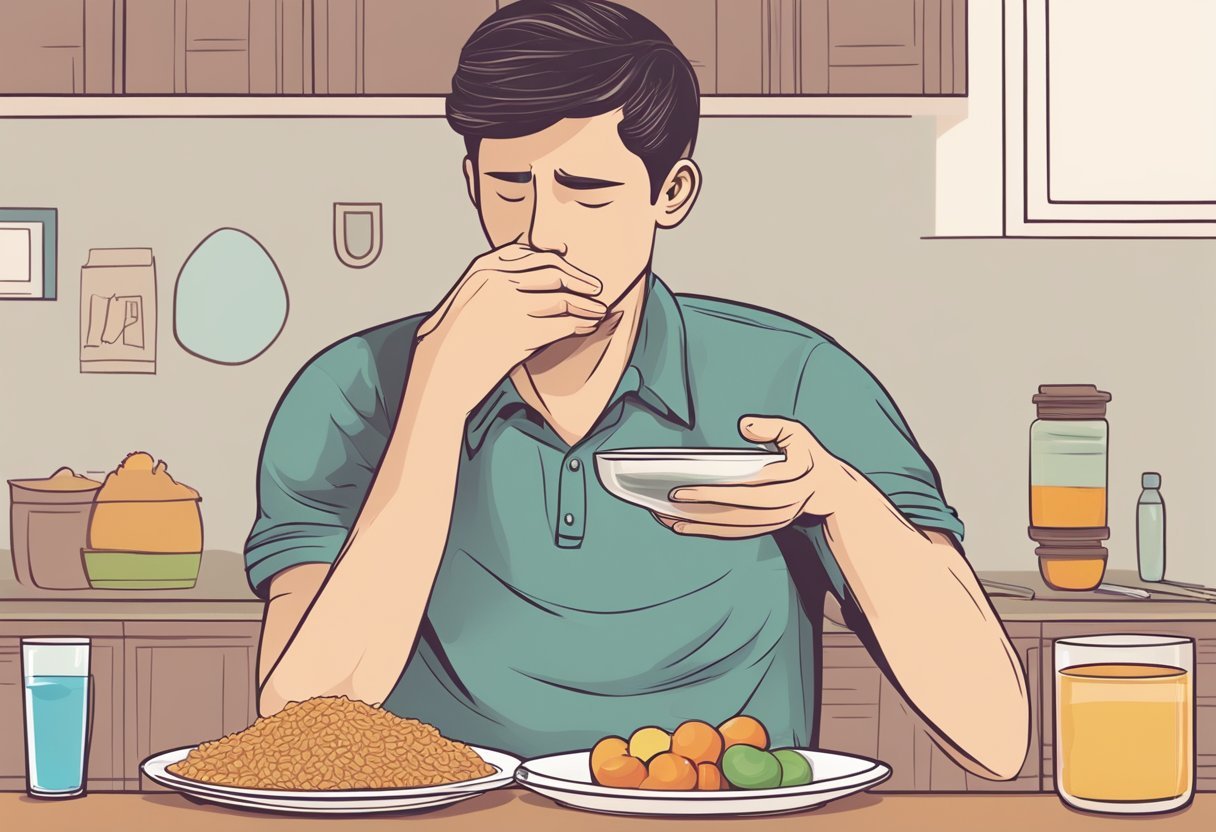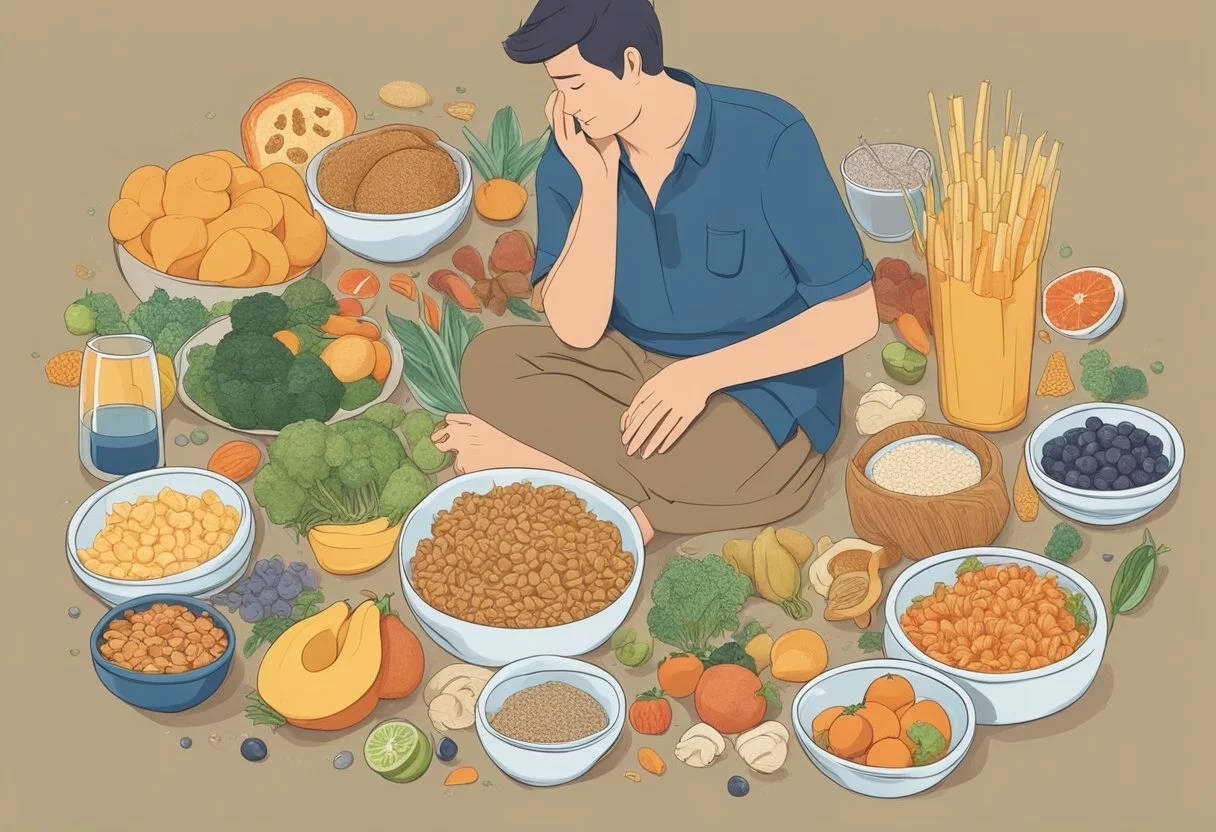Constipation
Symptoms, Causes, and Home Remedies
Discover > Health Conditions > Constipation: Symptoms, Causes, Home Remedies
Constipation is a common condition that affects people of all ages. It occurs when bowel movements become difficult or less frequent than usual, causing discomfort and sometimes even pain. This article will discuss the various symptoms, causes, and home remedies for constipation, providing readers with a better understanding of this often uncomfortable ailment.
There are several factors that can contribute to constipation, such as dehydration, lack of fiber in one's diet, and certain medications, among others. Understanding the causes of constipation can help individuals take proactive steps to reduce the likelihood of experiencing this condition. Additionally, knowing the symptoms of constipation can aid in recognizing when to seek professional help or implement home remedies in order to alleviate the discomfort.
Home remedies for constipation have been employed for centuries, often providing relief without resorting to medical intervention. From increasing fluid and fiber intake to utilizing natural laxatives, there are various strategies that can help individuals manage their constipation symptoms. This article aims to inform readers of these home remedies, granting them the knowledge needed to combat this common issue confidently and effectively.
Symptoms of Constipation
Constipation can manifest itself in various ways with varying degrees of discomfort. In this section, we will explore the most common symptoms associated with constipation, grouping them under two main categories: physical discomfort and changes in bowel movements.
Physical Discomfort
Pain: One of the most common physical symptoms of constipation is pain in the lower abdomen. This occurs due to a buildup of hard stools in the colon, which causes significant pressure on the abdominal walls.
Bloating: Alongside pain, constipation can also cause bloating of the stomach. This is a direct result of accumulated waste in the colon, which leads to a feeling of fullness or tightness in the abdominal area.
Nausea: In some cases, individuals suffering from constipation may also experience nausea. Nausea is often a byproduct of both stomach pain and bloating, as the body attempts to cope with the overall discomfort.
Changes in Bowel Movements
Infrequent bowel movements: People with constipation typically experience fewer bowel movements than usual, sometimes only once or twice a week.
Straining: When bowel movements do occur, there may be a significant amount of straining involved. This is due to the body's difficulty in passing the hard stools accumulated in the colon.
Hard stools: Constipated individuals often produce hard and lumpy stools. This is a result of the colon absorbing too much water from the stools, making them dry and difficult to pass.
Incomplete evacuation: Another symptom of constipation is the sensation of incomplete evacuation after a bowel movement. This may cause further discomfort and restlessness as the individual feels like they still need to pass more stools.
In summary, constipation can lead to a range of uncomfortable symptoms, both in terms of physical discomfort and changes in bowel movements. Awareness of these symptoms can help individuals identify the condition early on and seek appropriate remedies to alleviate their discomfort.
Common Causes of Constipation
Constipation often occurs due to a variety of factors, which can be categorized into lifestyle, medications, and health conditions. Knowing these common causes can be helpful in addressing constipation and finding appropriate solutions.
Lifestyle Factors
Diet: A lack of fiber in the diet can contribute to constipation. High-fiber foods such as fruits, vegetables, and whole grains can help maintain regular bowel movements.
Dehydration: Insufficient fluid intake can cause stools to become hard and difficult to pass. Drinking plenty of water and other fluids is essential for preventing constipation.
Stress: High stress levels can negatively impact bowel movements, resulting in constipation. Managing stress through relaxation techniques or counseling can improve digestive health.
Travel: Changes in routine, such as jet lag or sitting for long periods of time during travel, can disrupt normal bowel function and lead to constipation.
Age: Older adults are more prone to constipation due to a decrease in metabolism and slower muscle contractions in the digestive system.
Milk: Dairy products, particularly milk, can cause constipation in some individuals, especially those who are lactose intolerant.
Medications and Health Issues
Medications: Certain medicines are known to cause constipation, including iron supplements, antidepressants, and some pain-relief medications.
Hormonal imbalances: Hormonal changes during pregnancy or menstruation can affect bowel movements, sometimes leading to constipation.
Medical conditions: Several health conditions can contribute to constipation, such as stroke, multiple sclerosis, and diabetes. These conditions may alter muscle function in the digestive system or cause systemic inflammation, making bowel movements more difficult.
It is essential to understand the common causes of constipation to identify any potential factors affecting one's bowel habits. Addressing these factors with lifestyle modifications, medical treatment, or consultation with a healthcare provider can help to alleviate constipation and improve overall gut health.
Chronic Versus Temporary Constipation
Chronic constipation is a condition where an individual experiences infrequent bowel movements or has difficulty in passing stool over an extended period, typically three months or longer. On the other hand, temporary constipation is a short-term issue that usually resolves within a few days or weeks. It's important to understand the differences between these two types of constipation to determine appropriate treatments and preventative measures.
In terms of causes, chronic constipation is often linked to underlying medical conditions or medications. Some common causes include:
Irritable bowel syndrome (IBS): A disorder that affects the large intestine, leading to abdominal pain, bloating, and changes in bowel movements.
Neurological disorders: Conditions such as Parkinson's disease, multiple sclerosis, or spinal cord injuries can affect the nerves responsible for bowel movements.
Temporary constipation is frequently due to lifestyle factors or short-term issues, such as:
Dehydration
A sedentary lifestyle
A low-fiber diet
Stress or anxiety
When it comes to treatments, chronic constipation often involves a combination of therapies, such as:
Prescription medications
Over-the-counter (OTC) laxatives
Physical therapy or exercise
Changes to diet and hydration
Temporary constipation usually requires simple home remedies like:
Increasing fiber intake (fruits, vegetables, whole grains)
Drinking plenty of water
Incorporating regular exercise
Practicing relaxation techniques
Prevention measures for both forms of constipation often share similarities. Establishing a healthy lifestyle with a balanced diet, proper hydration, and regular exercise can help prevent both chronic and temporary constipation.
In conclusion, understanding the differences between chronic and temporary constipation can help identify the appropriate treatment and prevention strategies for individuals. Always consult with a healthcare professional if constipation persists or worsens, as it may indicate an underlying health issue.
Dietary Implications and Remedies
Increasing Fiber Intake
One of the most effective ways to combat constipation is by increasing the intake of fiber in one's diet. There are two main types of fiber: soluble and insoluble. Both types play crucial roles in maintaining healthy bowel movements. High-fiber foods include:
Fruits e.g. apples, pears, and berries
Vegetables e.g. broccoli, spinach, and carrots
Whole grains e.g. brown rice, whole wheat bread, and oatmeal
Legumes e.g. beans, lentils (how long do lentils last?), and peas
It is advised to gradually increase the fiber intake and ensure a balance between soluble and insoluble fibers for optimal results.
Hydration and Constipation
The importance of adequate hydration cannot be overstated when it comes to preventing constipation. Water aids digestion by softening stools and making them easier to pass through the colon. Signs of dehydration include:
Drinking at least 8 cups of water daily is generally recommended for proper hydration. Additionally, beverages such as coffee can stimulate bowel movements for some individuals, but excessive caffeine consumption might increase the risk of dehydration.
Impact of Processed Foods
A diet high in processed foods can contribute to constipation due to their low fiber content and high levels of refined sugars, unhealthy fats, and additives. Some examples of processed foods to limit or avoid include:
Fast food
Canned goods with high sodium content
Chips and cookies
Sugary beverages
Moreover, consuming excessive amounts of dairy products like cheese and milk can also exacerbate constipation for some people, especially those with lactose intolerance.
In conclusion, by incorporating high-fiber foods and proper hydration into one's diet and reducing the intake of processed foods, a significant improvement in bowel regularity can be achieved.
Medical Remedies
Pharmaceutical Interventions
When home remedies and lifestyle changes do not provide relief from constipation, doctors may recommend pharmaceutical interventions. These medications include:
Laxatives: Various types of laxatives can help stimulate bowel movements. Stimulant laxatives, such as bisacodyl and senna, encourage the colon to contract, helping to move stool along. Osmotic agents, such as milk of magnesia and polyethylene glycol, work by drawing more water into the colon to soften the stool and ease passage.
Stool softeners: These medications, also known as emollients, help to moisten the stool, making it easier to pass. Common stool softeners include docusate sodium and docusate calcium.
Fiber supplements: Soluble fibers like psyllium can help to add bulk to the stool and promote more regular bowel movements.
Prescription medications: In some cases, doctors may prescribe medications like lubiprostone or linaclotide to treat chronic, severe constipation.
It is essential to follow the dosing instructions carefully, as overuse of laxatives can lead to dependence and damage to the colon.
Surgical Interventions
In rare situations where constipation is caused by a physical obstruction or structural problem in the colon, surgical interventions may be necessary. Some examples of surgical procedures for treating constipation include:
Bowel resection: In this procedure, the surgeon removes the damaged or obstructed part of the colon and reattaches the remaining healthy sections.
Colostomy: When a bowel resection is not possible, a colostomy may be performed. This involves creating an opening on the abdomen, known as a stoma, which allows waste to pass out of the body into a pouch.
Rectopexy: This surgery is performed to correct rectal prolapse, a condition where the rectum protrudes from the anus.
Any surgical intervention should be considered a last resort, with all other treatments and remedies tried first. It is critical to discuss all available options and potential risks and benefits with a healthcare professional before making any decisions about constipation treatment.
Lifestyle Changes as Home Remedies
Importance of Regular Exercise
Incorporating regular exercise into one's daily routine can play a significant role in alleviating constipation. Physical activity, such as walking, jogging, or swimming, can help stimulate the muscles in the intestines, making it easier for stool to move through the colon. Aim for at least 30 minutes of moderate intensity exercise, 5 days per week for optimal results. Additionally, it is essential to stay active throughout the day. Some suggestions include:
Take the stairs instead of the elevator
Park farther away from your destination to encourage walking
Incorporate regular stretching exercises or yoga
Stress Management
Stress can negatively impact bowel movements, leading to constipation. Hence, it is crucial to manage stress effectively. Some excellent methods to alleviate stress and promote regular bowel movements include:
Meditation: Practicing mindfulness and deep breathing exercises can help calm the nervous system and restore balance in the body.
Adequate Sleep: Ensuring a minimum of 7-9 hours of quality sleep per night is vital for overall stress reduction.
Relaxation Techniques: Engaging in activities such as taking warm baths, reading, or listening to soothing music can help lower stress levels.
Routine and Regularity
Establishing a consistent routine can significantly improve bowel regularity and reduce the occurrence of constipation. Some strategies to develop a healthy routine include:
Dedicate a specific time each day to visit the restroom
Consume meals at regular times throughout the day
Prioritize hydration by drinking plenty of water and limiting diuretics like coffee and soda
By incorporating these lifestyle changes focused on exercise, stress management, and routine regularity, one can effectively combat constipation and improve overall gut health.
Constipation in Specific Populations
Pregnancy and Constipation
Pregnancy can often lead to constipation due to hormonal changes, increased pressure on the rectum, and iron supplementation. To alleviate constipation symptoms during pregnancy, consider:
Increasing fiber intake: Eat foods like whole grains, fruits, and vegetables.
Staying hydrated: Ensure sufficient water intake, at least 2 liters a day.
Exercising: Participate in light physical activities such as walking or swimming.
Pelvic floor exercises: Strengthening the pelvic floor can improve bowel control.
Elderly Population
Constipation is more prevalent among the elderly due to factors such as:
Reduced physical activity: A more sedentary lifestyle can result in slower bowel movements.
Dehydration: Older adults may have difficulty staying hydrated, impacting bowel movements.
Medications: Some medications, such as opioids and antidepressants, can contribute to constipation.
Underlying conditions: Conditions like diabetes and irritable bowel syndrome (IBS) can cause constipation.
To manage constipation in the elderly population, try the following:
Increase fiber intake through whole grains, fruits, and vegetables.
Stay hydrated by consuming water, soups, and other fluids.
Engage in light physical activity like walking to aid bowel movements.
Consult a healthcare professional for safe laxatives or medication adjustments.
Constipation in Patients with Neurological Disorders
Constipation is a common symptom for individuals with neurological disorders, such as Parkinson’s disease and multiple sclerosis (MS). This can result from:
Impaired nerve function: Damage to nerves controlling the bowel muscles may affect movement.
Medication side effects: Some medications for neurological conditions can cause constipation.
Reduced physical activity: A decrease in physical activity may slow down the digestive process.
Managing constipation in patients with neurological disorders may involve:
Fiber-rich diet: Encourage consuming whole grains, fruits, and vegetables.
Fluid intake: Ensure adequate hydration to soften stool.
Physical activity: Engage in supervised, gentle exercises or movement therapies.
Medication review: Seek medical advice for possible medication adjustments or laxatives.
Complications of Constipation
Constipation can lead to various complications if not addressed promptly. In this section, we will discuss three main complications: Anal Fissure, Bowel Obstruction, and Fecal Impaction.
Anal Fissure
An anal fissure is a small tear in the lining of the anus, often caused by passing hard or large stools during constipation. This condition can result in pain, bleeding, and even a burning sensation during bowel movements. Some common symptoms include:
Sharp pain during and after bowel movements
Visible tear in the skin around the anus
Blood on the toilet paper or in the toilet bowl
To help prevent anal fissures, one should incorporate fiber-rich foods and drink plenty of water to avoid constipation. Additionally, maintaining proper hygiene and not straining during bowel movements can help reduce the risk of developing anal fissures.
Bowel Obstruction
Bowel obstruction, or intestinal obstruction, occurs when the intestines are partially or completely blocked, preventing the passage of stool and gas. Constipation can lead to bowel obstruction in severe cases. Some symptoms of bowel obstruction may include:
Abdominal pain and cramping
Bloating and gaseousness
Inability to pass gas or stool
Weight loss
A medical professional will likely conduct a rectal exam or use imaging techniques to diagnose bowel obstruction. Treatment options can range from procedural interventions to surgery, depending on the severity and cause of the obstruction.
Fecal Impaction
Fecal impaction is a severe form of constipation where a large, hard mass of stool becomes stuck in the rectum or colon. It can lead to a variety of problems, such as:
Severe abdominal pain
Rectal bleeding or discharge
Rectal prolapse (when the rectum protrudes out of the anus)
Bowel incontinence
Timely identification and treatment of fecal impaction is crucial. Treatment options depend on the severity of the impaction and may include the use of stool softeners, enemas, or manual removal by a medical professional.
To sum up, constipation can lead to complications like anal fissure, bowel obstruction, and fecal impaction. It is essential to maintain a healthy diet and lifestyle habits to prevent these complications and address constipation early on.
Preventive Measures
Taking preventive measures can help avoid constipation or minimize its symptoms. This includes adopting healthy dietary habits and regularly visiting your doctor for medical check-ups. By focusing on these two aspects, you can maintain a well-functioning digestive tract and ensure smooth bowel movements.
Recommended Dietary Habits
One of the most effective ways to prevent constipation is by incorporating dietary fiber into your daily meals. Fiber is essential for maintaining regular bowel movements as it adds bulk to the stool, making it easier to pass. Here are some tips to increase your fiber intake:
Consume plenty of fruits and vegetables, such as apples, berries, broccoli, and spinach.
Include whole grain foods, like whole wheat bread, brown rice, and oatmeal.
Opt for legumes, such as beans, lentils, and chickpeas.
In addition to fiber, be sure to drink adequate fluids to help soften the stool. Aim for at least 8 cups of water per day, and consider incorporating other fluids like herbal teas and natural fruit juices as well.
For some people, fiber supplements or stool softeners may be necessary to ensure regular bowel movements, especially when dietary changes are not sufficient. Consult with your healthcare provider before adding any supplements to your routine.
Lastly, engaging in regular physical activity not only promotes overall health but also has a positive impact on the digestive system. Exercise helps stimulate the muscles in the digestive tract to facilitate bowel movements. Aim for at least 30 minutes of moderate exercise most days of the week.
Role of Regular Medical Check-up
Regular medical check-ups play a crucial role in the prevention of constipation, as they help identify any underlying issues that could impact your digestive health. During these visits, your doctor may perform a physical exam to assess the functioning of your digestive tract, ensuring that everything is working normally.
Additionally, your healthcare provider can offer personalized advice and guidance on dietary habits and lifestyle changes to help maintain a healthy digestive system. By keeping up with regular doctor visits and adhering to recommended prevention strategies, you can effectively minimize the risk and symptoms of constipation.
#treat constipation #causing constipation #pelvic floor muscles #diet and lifestyle changes #medical history #colon absorbs water #stomach cramps #relieve constipation








